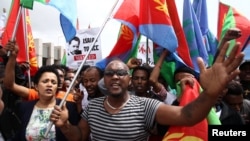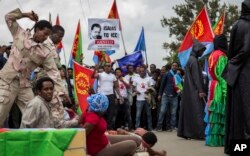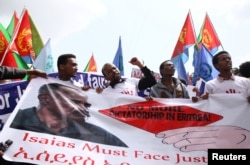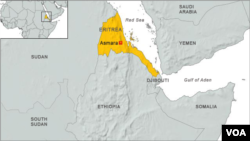This week, thousands of Eritreans gathered in Geneva, Switzerland, to both support and protest a new U.N. report alleging that the leaders of the Eritrean government have committed crimes against humanity.
Elsewhere, hundreds of Eritrean refugees gathered outside African Union headquarters in neighboring Ethiopia to protest the alleged crimes back home.
The report comes from a commission of inquiry set up more than two years ago to investigate human rights in Eritrea.
The commission gathered testimony from 833 people in 13 countries including Australia, Canada and the United States, but was not allowed to travel inside Eritrea to conduct its investigation.
Its report outlined arbitrary arrests, torture, rape, enslavement, murder and reprisals against family members of dissidents inside the country.
During an interactive dialogue at the U.N. Human Rights Council with the commission and other organizations and stakeholders on Monday, Eritrea’s head of political affairs and presidential adviser said that the commission not only failed to prove the accusations but was overstepping its mandate.
“The Commission has made the incredible judgment that the human rights situation in Eritrea constitutes a threat to international peace and security, as a fig leaf to try to send yet another African country to the International Criminal Court ((ICC)),” Yemane Gebreab told the attendees.
Testimonies
In the audience were children of jailed journalists, political prisoners in the country and other Eritrean activists who also gave their testimonies.
Outside the official proceedings, demonstrators waved Eritrean flags and signs denouncing the ruling party – the People’s Front for Democracy and Justice – as criminals.
“Geneva was literally flooded by people who are requesting that enough is enough,” said Daniel Rezene Mekonnen, an Eritrean human rights lawyer, who traveled to Geneva to participate in the dialogue. “There must be an end to the situation of crimes against humanity in Eritrea and people were shouting telling the world that they support the findings of the commission of inquiry.”
Mekonnen said the most heartbreaking aspect of the events was to hear supporters of the Eritrean government deny the seriousness of crimes being committed inside the country.
“When they deny the realities of the human rights violations in Eritrea, they are insulting the victims, and this is inhuman,” he said.
“These people who are suffering in the dungeons of the regime in all of the formal and informal prison systems in Eritrea, what we call the Eritrean network of gulags, they are innocent people," Mekonnen said. "They don’t deserve that. Or if the government believes that they have committed something else, they should be brought to a court of justice.”
Others believe just as strongly that Eritrea is being wrongly maligned by the international community.
Simon Tesfamariam is the founder and director of Red Sea Institute, a nonprofit doing research in Eritrea, and a supporter of the government.
“There’s nothing wrong with looking at the human rights situation of the nation at all,” Tesfamariam said. “Those who are investigating the human rights situation are not impartial, not independent, not objective and not neutral.”
Impartiality questioned
He questioned the impartiality of the U.N.’s special rapporteur, Sheila B. Keetharuth, who previously worked for Amnesty International and who, he said, has called for Eritrean President Isaias Afwerki to be tried at the ICC. He also criticized the lack of evidence like video or audio to substantiate the allegations.
“You have anonymized allegations. You don’t have any hard evidence, any tangible evidence to make us feel comfortable with the fact that these allegations may, in fact, be true,” he said. “I mean just think of it in the court of law. Who would take seriously 100 percent anonymized allegations? Who would take seriously that those that are not anonymized are not coming from those who have clearly checkered relations with whom they are making allegations against?”
The report outlines numerous abuses including the use of national service, which began as a development program but now continues for years and is equated to enslavement in the report. Government officials say it is necessary to stay on a war footing with Ethiopia as recent clashes on the Ethiopia-Eritrea border attest.
The report now goes to the U.N. Human Rights Council (UNHRC), which will decide whether to adopt a resolution on the issue.
“This issue should be passed to the Security Council because only the Security Council has the power to make referrals to the International Criminal Court," commission chairman Mike Smith told VOA.
“So, yes, these are individual crimes, and yes, we have found that there are a number of people that we have reason to believe are responsible for those crimes," Smith said.













